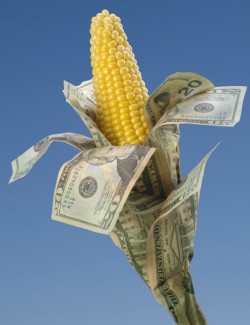 With the Senate, on a second attempt, successfully passing an amendment to end the 45-cent-per-gallon ethanol subsidy for American refiners and the 54-cent tariff on imported ethanol, I thought I’d point to this terrific op-ed in Scientific American on how to solve the food crisis. According to author Timothy Searchinger of Princeton University, it’s the biofuels, stupid.
With the Senate, on a second attempt, successfully passing an amendment to end the 45-cent-per-gallon ethanol subsidy for American refiners and the 54-cent tariff on imported ethanol, I thought I’d point to this terrific op-ed in Scientific American on how to solve the food crisis. According to author Timothy Searchinger of Princeton University, it’s the biofuels, stupid.
The crisis certainly isn’t due to a lack of agricultural productivity, no matter what agribusiness and the USDA say. Searchinger claims:
[T]otal world grain production last year was the third highest in history. Indeed, it has grown since 2004 at rates that, on average, exceed the long-term trend since 1980 and roughly match the trends of the past decade. Even with bad weather in Russia and northern Australia last year, global average crop yields were only 1 percent below what the trends would lead us to expect, a modest gap.
It’s also not caused by demand from China. Searchinger points out that “consumption in China and India is rising no faster than it has in previous decades. In general, Asia’s higher incomes have not triggered the surge in demand for food.”
But biofuels?
Since 2004 biofuels from crops have almost doubled the rate of growth in global demand for grain and sugar and pushed up the yearly growth in demand for vegetable oil by around 40 percent. Even cassava is edging out other crops in Thailand because China uses it to make ethanol.
This is one of the clearest statements of the effects of biofuel production on global demand I’ve run across. Just as in a presidential election where any number of slices of the electorate can be said to have provided the winning margin (“It was Indiana!,” “It was non-college whites!,” “It was the rural vote!”), so too can any number of “causes” be found for a food crisis. But Searchinger’s formulation makes it hard to deny that biofuels are to blame for this one.
He also makes an interesting point about industry and government’s chronic unwillingness (or is it inability?) to recognize the effect biofuel production has on prices. As he puts it:
Although most experts recognize the important role biofuels play, they often underestimate their effects. Many of them misinterpret the economic models, which understate the degree to which biofuels drive up prices. These models are nearly all designed to estimate biofuels’ effects on prices over the long term, after farmers have ample time to plow up and plant more land, and do not speak to prices in the shorter term.
So in the long term, when production has a chance to “catch up” to demand caused by biofuels, price changes are smoothed out and things appear stable. But that perspective also makes it easy to overlook what it is that “short-term” price spikes cause: hunger, riots, and political destabilization in the developing world.
I don’t know if Congress will really end ethanol subsidies — the bill to which the Senate amendment is attached has uncertain prospects. But I would like to destroy the fantasyland that the White House and the USDA live in where biofuels are agriculturally “free.” The price of growing fuel for our cars is clear and unacceptably high.



